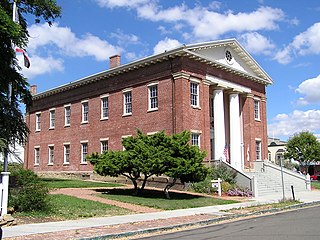
Benicia Capitol State Historic Park is a state park in Benicia, California. The park is dedicated to California’s third capitol building, where the California State Legislature convened from February 3, 1853 to February 24, 1854, when they voted to move the state capital to Sacramento. It is the only pre-Sacramento capitol that survives. The park includes the Fischer-Hanlon House, an early Benicia building that was moved to the property and converted into a home in 1858, after the legislature departed. Benicia Capitol State Historic Park just off the city's main street also includes a carriage house, workers' quarters and sculptured gardens.

California Proposition 14 was a November 1964 ballot proposition that amended the California state constitution, nullifying the Rumford Fair Housing Act. Proposition 14 was declared unconstitutional by the California Supreme Court in 1966. The decision of the California Supreme Court was affirmed by the U.S. Supreme Court in 1967 in Reitman v. Mulkey.

The 1998 California gubernatorial election was an election that occurred on November 3, 1998, resulting in the election of Gray Davis, the state's first Democratic governor in 16 years. Davis won the general election by an almost 20% margin over his closest opponent, Republican Dan Lungren. Davis succeeded Pete Wilson who was term limited.

The California gubernatorial election, 1861 took place on September 4, 1861. Incumbent Governor John G. Downey was not a candidate for renomination, as his Democratic Party had violently ruptured over the issue of slavery and secession. Downey was a Lecompton Democrat, those who favored slavery in the Kansas Territory and who were running as now as the Breckenridge or "Chivalry" Democrats. These Chivalry Democrats supported Attorney General John McConnell. Anti-slavery or anti-secession Democrats were the "Unionist" Democrats who favored John Conness.

José Antonio Castro was a Californio politician, statesman, and military leader who served as acting governor of Alta California in 1835. He was also Commandante General of Mexican forces in northern areas of Las Californias during the Bear Flag Revolt and the Mexican–American War of 1846–1848.

The California gubernatorial election, 1970 was held on November 3, 1970. The incumbent, Republican Ronald Reagan, won re-election over Democrat and Speaker of the Assembly Jesse "Big Daddy" Unruh.

The 1974 California gubernatorial election took place on November 5, 1974. The primary elections occurred on June 4, 1974. Incumbent Governor and former actor Ronald Reagan was retiring after two terms. Democratic Secretary of State Jerry Brown, son of former Governor Pat Brown, defeated Republican Controller Houston I. Flournoy in the general election.
Catalan Americans are Americans of Catalan descent. The group is formed by Catalan-born naturalized citizens or residents, their descendants and, to a lesser extent, citizens or residents of Catalan descent who still acknowledge Catalan ancestry.

The 2010 California gubernatorial election was held November 2, 2010 to elect the Governor of California. The primary elections were held on June 8, 2010. Because constitutional office holders in California have been prohibited from serving more than two terms in the same office since 1990, incumbent Republican Arnold Schwarzenegger was ineligible to run for re-election for a third term. Former Governor Jerry Brown, to whom the term limits did not apply due to a grandfather clause, defeated Meg Whitman in the general election. Brown was sworn into office on January 3, 2011.

The 2014 California gubernatorial election was held on November 4, 2014, to elect the Governor of California, concurrently with elections for the rest of California's executive branch, as well as elections to the United States Senate in other states and elections to the United States House of Representatives and various state and local elections.

The 2018 California gubernatorial election was held on November 6, 2018, to elect the 40th Governor of California. Incumbent Democratic Governor Jerry Brown was ineligible to run for reelection for a third consecutive term due to term limits from the Constitution of California.

The 1855 Ohio gubernatorial election was held on October 9, 1855. Incumbent Democratic Governor of Ohio William Medill became governor after the resignation of Reuben Wood to accept a consulship, and Lt. Governor Medill became elected in his own right in 1853. The 1855 election was one of the first major tests of the fledgling Republican Party, then still a coalition of various anti-slavery forces, including former rival Democrats and Whig members. This election led them to quickly dominate Ohio politics for the next half-century.
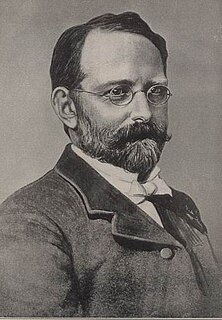
The California gubernatorial election, 1902 was held on November 4, 1902 to elect the governor of California.

The 1894 California gubernatorial election was held on November 6, 1894 to elect the governor of California.

The 1886 California gubernatorial election was held on November 2, 1886 to elect the governor of California.
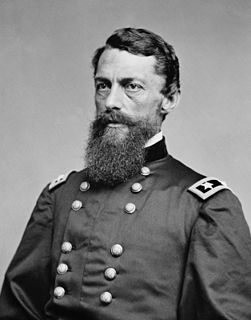
The 1882 California gubernatorial election was held on November 7, 1882 to elect the governor of California.
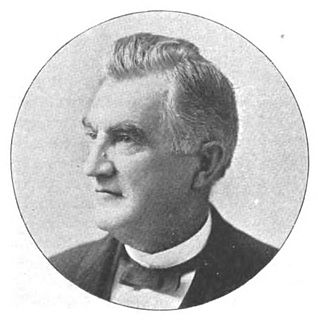
The 1875 California gubernatorial election was held on September 7, 1875 to elect the governor of California.

The 1857 California gubernatorial election was held on September 2, 1857 to elect the governor of California.
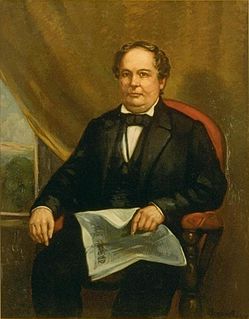
The 1855 California gubernatorial election was held on September 5, 1855 to elect the governor of California. Incumbent governor John Bigler lost his bid for reelection.

The 1849 California gubernatorial election was held on November 13, 1849 to elect the first governor of California. Peter Hardeman Burnett won in a five-way race.


















